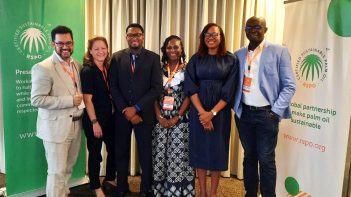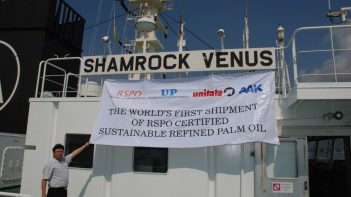Meet Nor Azizah Pibu, 43, is a widow with 5 children. Born and raised in a fishermen village, she moved to Kampung Perpaduan in Kinabatangan, Sabah when she was 17 years of age following her marriage to her late husband.
As her husband was unemployed for many years, she as a mother and wife decided to grow her own crops to sustain her family. With some help from the villagers, she applied for 15 hectares of land from the government of Sabah.
As the sole breadwinner for her family, her focus was to make sure her family had enough to eat and to provide the children with basic education she began her journey into the oil palm world.
There had been a trend to plant cocoa in the Kinabatangan villages. However, those in Azizah’s village opted for oil palm as the yield promised a better income.
With the assistance from Sabah’s Ministry of Agriculture, she was provided with an initial batch of seedlings and she joined the training that was organised for all villagers.
Some years passed and Azizah came into contact with Nestlé’s “RiLeaf” project. It’s a project that is working on Riparian Reforestation, which actively encourages the local community to replant with native forest tree seedlings and the RiLeaf project provides assistance for this. She became an active member of the project and decided to make use of her leisure time to become a supplier of seedlings to the reforestation project.
The project’s other focus is to promote sustainability practices among oil palm smallholders. This seeks to reduce the environmental impact of oil palm plantations through the minimization of chemical fertilizers via a “back-to-nature” soil amendment approach. It also promotes “back-to-basics” Good Agricultural Practices, and involves technical trials and piloting field test plots.
Through Project RiLeaf, Azizah learned that she, too, could produce her palm oil sustainably to minimize impact to the forest, local land and environment. Gradually, with her growing awareness and interest, she started working towards being a certified oil palm grower with the assistance of the Wild Asia Group Scheme (WAGS).
WAGS assists small independent palm oil producers to improve their farming practices and achieve compliance by providing a centralized management system, local coordination, technical assistance and training, as well as supporting producer groups on the path towards greater sustainability and certification, using the RSPO Group Certification Standard and the Malaysia National Interpretation of the RSPO P&C
"Since being involved the smallholders program, I became aware of why I should be certified as an oil palm grower and I’m doing my part by practising sustainability,” Azizah said. She observed that her oil palm yield production has also increased with the new practices.
She added: “I now realize that although we are smallholders, we do play a big role in the oil palm industry.”
On November 19, Azizah along with two other representatives of smallholders group from Indonesia received their certificates during RSPO’s 12th Annual Roundtable Meeting on Sustainable Palm Oil in Kuala Lumpur.
Keep reading
Call for Proposal: Study on Wild Palms in West and Central Africa

RSPO hosts first Africa downstream sustainable palm oil supply chain forum in Cape Town

Nearly two decades on, Europe continues to drive global demand for RSPO Certified Palm Oil

Communicating Sustainable Palm Oil - examples of success across Europe
[EOT] Terms of Reference: Independent Smallholders Outreach Programme in Indonesia

RT2023 Delegates Propose Solutions to Reinforce RSPO’s Assurance System – End-Year Highlights of Assurance Standing Committee
RSPO UK Members' Day Examines Shifting Dynamics of Doing Business within Europe

Celebrating 20 Years of RSPO’s Sustainability Journey




